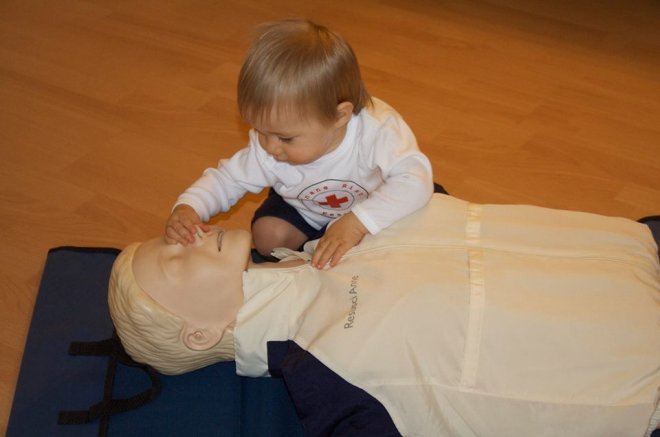
World First Aid Day is a global observance held on the second Saturday in September and this year it falls on Sept. 9. The International Federation of Red Cross and Red Crescent Societies (IFRC) introduced World First Aid Day in 2000.
The IFRC believes that first aid should be accessible to all, including the most vulnerable, and should also be an integral part of a wider developmental approach.
Each year, more than 100 Red Cross and Red Crescent Societies around the world organise events and ceremonies on the second Saturday of September to raise public awareness of how first aid can save lives in everyday and crisis situations. It is essential that everyone has some knowledge of a few essential first aid tips, in case of an emergency.
MINOR CUTS
Minor cuts can be treated at home or on the spot. It is essential to have a first aid kit with you, or somewhere in close reach. Wash your hands before attending to the injury, and then wash the area with soap and warm water. Minor cuts usually stop bleeding on their own, but stubborn cuts may require a bit of pressure—pressing a clean cloth over the cut should do the trick. Apply an antibiotic cream, to keep the area moist and help stave off infection, and then cover with a bandage. If the cut does not stop bleeding after 10-15 minutes, shows signs of swelling or shows muscle or bone, it is best advised to see a physician.
SCRAPES
A scrape is an area of skin that has been rubbed off, usually happens after a person falls or brushes themselves against a rough object. That can also be treated at home, and usually do not pose any serious health risk. Before touching the injury, hands must be washed s to eliminate any chances of transferring germs which may cause an infection to the wound as these types of injuries usually tend to be dirty. Give the wound a wash with warm water and an antiseptic. If the open area is bleeding, apply pressure with a clean cloth—it can take up to 15 minutes for bleeding to stop, especially with larger scrapes. Apply an antibiotic ointment and cover the area with a bandage. If the scrape is large, or if there is dirt and debris deep inside the wound that you can't get out, check in with a healthcare provider.
SPLINTERS
Splinters may possibly be tiny, but can cause excruciating pain. In a rush to remove the object, the risks of safety and infection can easily be neglected.
Before removing the splinter, wash your hands and the affected area with soap and warm water. Use tweezers or a needle, sterilized with rubbing alcohol, extract the splinter from the skin. After extracting the splinter, apply some baby oil or petroleum jelly to help soothe the affected area.
SPRAINS AND STRAINS
These can happen anytime and almost on any part of the body. However there is a difference between a minor strain and a major strain. To help treat these, remembering this abbreviation R.I.C.E may come in handy, which is Rest, Ice, Compression and Elevation.
Both strains and sprains are often the result of stretched muscles and ligaments that cause microscopic rips, rather than large tears. It is essential to rest the injured part of the body, and not to stress the injury further. Ice helps reduce pain and swelling, and should be applied several times throughout the day for the first 48 hours, beginning immediately after the injury. Compression helps quell swelling and limits bruising. A medical bandage or compression sleeve work well for this step. Lastly, elevation can help decrease swelling, so keep the injured area raised above the heart when possible. Dealing with sprains and strains can be difficult, it is important to know if the injury renders you problem to move or you're unable to bear weight on it, seek medical attention.
DIARRHOEA
Most cases of diarrhoea, runny or watery bowel movements are caused by gastrointestinal (GI) infections. Diarrhoea usually is not a sign of a serious illness, but it can cause a person to lose fluids, salts, and minerals. It's important to make sure fluids and nutrients are replaced. A person with diarrhoea gets dehydrated quickly. The body loses water this way so your primary objective should be to rehydrate them. Administer a diet, comprising lots of fluid. Keep doing so until there are signs of improvement. If the diarrhoea continues for more than 3-4 days, it is best advised to see a physician.
NOSE BLEED
A nosebleed is simply bleeding from the blood vessels in the nose. The medical term for nosebleed is epistaxis .Nosebleeds are common due to the location of the nose on the face, and the large amount of blood vessels in the nose. The most common causes of nosebleeds are drying of the nasal membranes and nose picking , which can be prevented with proper lubrication of the nasal passages and not picking the nose. Most nosebleeds can be stopped at home.
To help prevent the nose from bleeding further, firmly pinch the entire soft part of the nose just above the nostrils. Also sit and lean forward (this will ensure that blood and other secretions do not go down your throat) and breathe through your mouth. You should hold this position for 5 minutes. If bleeding continues, hold the position for an additional 10 minutes. If bleeding does not stop, go to the emergency department.
TOOTHACHE
Toothaches can't always be prevented, but the pain can be minimized with an over-the-counter clove oil in your first-aid kit, or simply a piece of clove to bite down on. Another effective remedy is also warm water and salt which helps reduce pain and swelling. However if the pain does not cease, and gets only worse, it is best to visit the dentist who can identify if there is something more severe.









